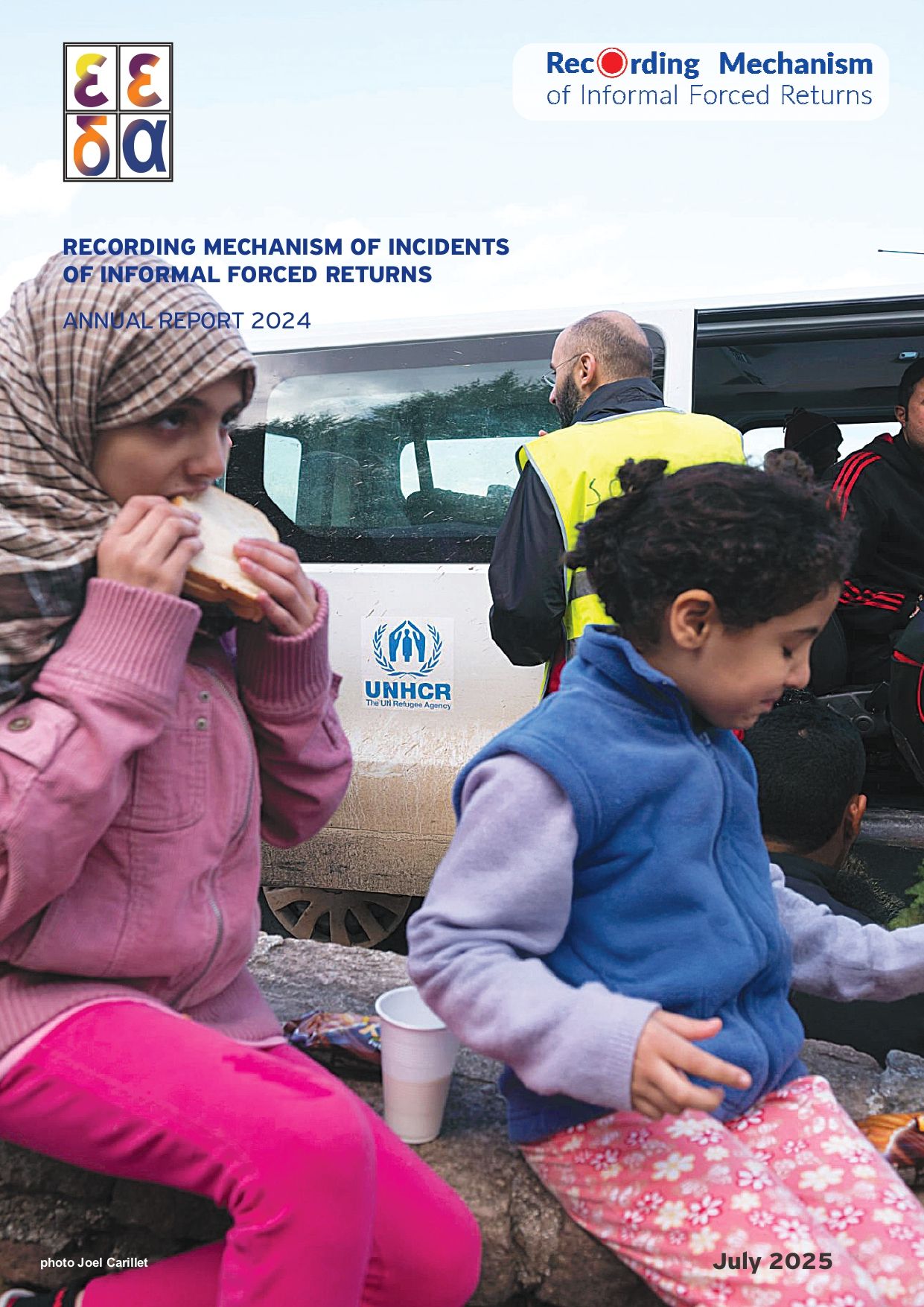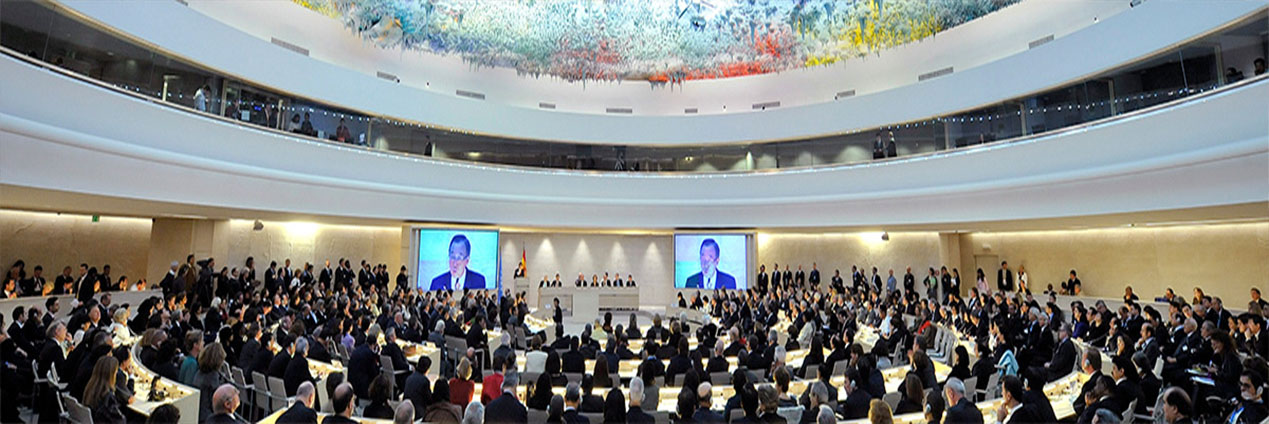Publication of the 2024 Annual Report of the Recording Mechanism of Informal Forced Returns


Recording Mechanism of Incidents of Informal Forced Returns
Press Release
Publication of the 2024 Annual Report
The Recording Mechanism of the GNCHR documents the consolidation of the characteristics of the modus operandi and identifies new components in the operations of informal forced returns (IFRs) reportedly taking place at the borders.
Athens, 17/07/2025
The Recording Mechanism of Incidents of Informal Forced Returns (Recording Mechanism) established by the Greek National Commission for Human Rights (GNCHR),[1] to enhance the guarantees of objectivity and reliability in reports concerning incidents of informal forced returns[2] from the Greek territory, publishes today its 2024 Annual Report.
The 2024 Annual Report is based on 61 testimonies and documents 52 incidents reportedly occurring between January 2022 and December 2024. The total number of alleged victims involved in these incidents is estimated at a minimum of 1,517 individuals, including at least 300 women, 225 children, and 133 persons with specific needs.
The Report presents comprehensive statistical data and a qualitative analysis of the findings drawn from the testimonies of the alleged victims, recorded in accordance with the Methodology of the Recording Mechanism.
For the third consecutive year, the Recording Mechanism records a significant concentration of testimonies concerning incidents of informal forced returns sharing common features, demonstrating the entrenchment of specific operational practices and the repetition of serious human rights violations at Greece’s borders.
Key findings:
- The alleged victims originate predominantly from countries whose nationals are frequently recognised as beneficiaries of international protection.
- Among them are three individuals who claim to have been recognised as refugees in Greece and one person who reports having been registered as an asylum seeker by the Greek authorities.
- The presence of eleven Turkish asylum seekers among the alleged victims indicates direct breaches of the principle of non-refoulement.
- The testimonies describe acts that point to serious violations of the principle of non-refoulement under the 1951 Geneva Convention Relating to the Status of Refugees, as well as breaches of the prohibition of inhuman or degrading treatment, the rights to liberty and life, the right to asylum, and the prohibition of collective expulsions, as safeguarded by the European Convention on Human Rights (ECHR) and the EU Charter of Fundamental Rights (CFREU). These acts also constitute criminal offences under Greek law.
- Such acts reportedly target individuals in situations of particular vulnerability, including people with serious illnesses or disabilities, pregnant women, elderly persons, and children.
- The testimonies recorded by the Recording Mechanism refer to the involvement of both uniformed personnel and individuals in civilian clothing. In some testimonies relating to incidents in Evros, it was reported that third-country nationals, speaking the victims’ languages and acting in cooperation with or under the instructions of uniformed officers, also took part in the removal operations.
The 2024 Annual Report also presents and analyses new findings and further insights into the modus operandi of IFRs. Specifically:
- For the first time, the Report analyses the practices of successive detention and convergent removal, highlighting their role as core operational patterns in IFRs.
- Testimonies relating to incidents in the Evros region indicate the existence of an operational network of secondary actions within the mainland (notably Thessaloniki and Komotini), meaning that victims were reportedly apprehended beyond the border zone. This pattern, documented for the third consecutive year, reveals the breadth and organisational structure of these operations.
- A clear distinction is observed between land incidents in Evros and maritime incidents. The former are characterised by networks of operations extending from the border into inland areas, while the latter focus mainly on maritime operations preventing approach or disembarkation on Greek islands.
- Testimonies point to qualitative differences in the use of violence. In incidents in Evros, violence reportedly had a punitive character and involved greater physical intensity, whereas in sea incidents, it mainly took the form of actions obstructing navigation and disembarkation, marked by increased danger to life and recorded fatalities.
The 2024 Annual Report of the Recording Mechanism is available here
The Recording Mechanism for Incidents of Informal Forced Returns brings together civil society organisations active in the field, providing legal, medical, psychosocial and other services to third-country nationals. All participating organisations have legal personality and representation in Greece. The UNHCR Representation in Greece supports the Recording Mechanism as a cooperating partner, providing technical assistance and expertise on issues related to refugee protection.
The testimonies recorded by the Recording Mechanism come from individuals who are not related to each other, except in the case of families or members of the same group. These individuals come into contact with civil society organisations while seeking assistance and voluntarily consent to the recording of their testimonies by the Recording Mechanism.
The Recording Mechanism does not take part in legal proceedings that may be initiated either by alleged victims and their legal representatives or by the prosecuting authorities. Through the safe identification and documentation of alleged victims, the Recording Mechanism encourages them to seek redress from the competent authorities and the judiciary.
[1] The Greek National Commission for Human Rights (GNCHR), as the National Human Rights Institution (NHRI) of Greece and the independent advisory body to the Greek State on issues relating to the promotion and protection of human rights, in accordance with the United Nations Paris Principles and Law 4780/2021, has, among its institutional mandates, the continuous monitoring of human rights issues, public awareness-raising, and the promotion of related research.
[2] The term informal forced returns refers to both the alleged pushbacks of asylum seekers and refugees and other forms of forced removal of third-country nationals from Greece that are reportedly carried out irregularly and without due process — in other words, without following the legal procedures required for such removals. By law, any forced return of a third-country national must be based on an individual decision, be subject to judicial review and effective remedies, and be implemented with full respect for fundamental human rights.

